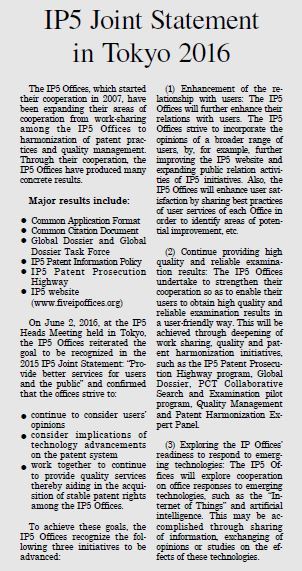IP5 bolster cooperation to deal with new technologies
Major countries adopt joint statement to cope with new IoT and AI challenges
By Korea HeraldPublished : June 22, 2016 - 17:22
The world’s five biggest intellectual property offices have agreed to increase cooperation in response to the rapid change in the IP environment brought on by new technologies such as artificial intelligence and the Internet of Things.
The heads of the “Intellectual Property 5” also reached an accord on their joint efforts to improve the patent application process.
The representatives produced those and other agreements at the end of the ninth IP5 Heads Meeting from May 31 to June 2 in Tokyo, Japan.
The heads of the “Intellectual Property 5” also reached an accord on their joint efforts to improve the patent application process.
The representatives produced those and other agreements at the end of the ninth IP5 Heads Meeting from May 31 to June 2 in Tokyo, Japan.

The IP5 consists of the European Patent Office, Japan Patent Office, Korean Intellectual Property Office, State Intellectual Property Office of China, and the U.S. Patent and Trademark Office. It was established in 2008 to improve the efficiency of the examination process for patents worldwide.
The IP5 offices currently collectively account for 80 percent of total patent applications filed globally. A total of 2.4 million patent applications were filed at the IP5 offices in 2015, which was an 8.6 percent increase in patent applications. Of the 2.4 million applications, 1 million patents were granted by the offices.
In their joint statement, the IP5 leaders unveiled their decision to improve the patent application process by providing fast and reliable results and to prepare for the changes brought by technological advances using collaborative research methods to evaluate the new technologies.
The meeting was attended by EPO president Benoit Battistelli, KIPO commissioner Choi Dong-gyou, SIPO deputy commissioner He Zhimin, and USPTO undersecretary of commerce for intellectual property and director Michelle K. Lee with JPO Commissioner Hitoshi Ito presiding over the meeting. The World Intellectual Property Organization director general Francis Gurry also attended the meeting as an observer.

“To address administrative and legal differences in countries’ patent systems is users’ biggest aspiration,” Choi said in the meeting.
“In this respect, the IP5 offices should support corporate innovation by jointly coping with newly rising technologies like artificial intelligence,” he added.
Artificial intelligence is a great headache in the patent industry, as there is still debate on how to patent the deep learning a computer system goes through to find a solution to a problem because a machine, not a researcher, finds the solutions.
Moreover, with artificial intelligence recently taking great strides in machine learning development -- as shown in Google’s artificial intelligence system AlphaGo’s recent defeat of legendary Korean Go player Lee Se-dol — creating guidelines to patent artificial intelligence is imperative.
The Internet of Things — daily devices that have network connections to send and receive data, including smart cars and smart home appliances — is also difficult to patent, as IoT devices combine multiple technologies, which industry insiders say will likely lead to patent wars similar to the smartphone patent wars that made headlines in recent years.
The IP5 leaders also agreed to continue to support the Patent Harmonization Expert Panel established in 2012 to standardize patent application evaluations and the IP5 Patent Prosecution Highway in 2014 to allow a fast-track application evaluation of a patent.
The heads of IP5 offices previously met with heads of industry groups including the Korea Intellectual Property Association, Japan Intellectual Property Association, Patent Protection Association of China, Businesseurope, and American Intellectual Property Law Association to better incorporate the opinions of users for the improvement of the patent application process.
By first cooperating in 2007, the IP5 offices have since met on an annual basis, except for 2009, to focus on eliminating unnecessary duplication of work among offices, enhancing patent examination efficiency and quality, and guaranteeing the stability of patent rights.
The 10th annual meeting of the heads of the IP5 will take place in Malta in Europe at the end of May next year.
By Lee Seo-young (seoyounglee@heraldcorp.com) and Lee Kwon-hyoung (kwonhl@heraldcorp.com)

-
Articles by Korea Herald









![[Graphic News] How much do Korean adults read?](http://res.heraldm.com/phpwas/restmb_idxmake.php?idx=644&simg=/content/image/2024/05/16/20240516050803_0.gif&u=)








![[Herald Interview] Byun Yo-han's 'unlikable' character is result of calculated acting](http://res.heraldm.com/phpwas/restmb_idxmake.php?idx=652&simg=/content/image/2024/05/16/20240516050855_0.jpg&u=)
